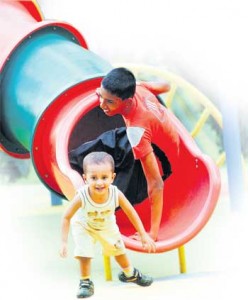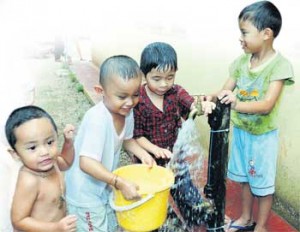No kidding, it’s the great outdoors
August 20, 2009 by admin
Filed under Related Interests
Children should be encouraged to play outdoors as it not only helps to stimulate their senses, but also gets them close to nature.

Elizabeth believes parents should consciously make time for their children to have outdoor play.
THERE was a time when evenings were synonymous with the sounds of excited children at play and traditional games were the norm. But these days, ask a child about a game and he’s more likely to name a computer game. Forget climbing trees or wading through ponds, just having time to be outdoors is a luxury few children enjoy. But depriving children of outdoor time means stripping them of the most wonderful environment for their development — nature. Nature provides a rich and stimulating environment for play and depriving children of the chance to engage with nature means taking away a valuable component in their early development, said Nallini Swaminathan, president of the Selangor Association of Play and Expressive Therapy (Sapet).
Nallini said when little girls play masak-masak (cooking) for example, they look for stones, leaves and plants and think about how to incorporate such items into their game. Eventually, they go and look for other items to make the game even more interesting. Through such activities, the child learns to take charge of her environment, deciding what to use and where to look for such things. She also gains a better understanding of her environment. She learns which plants can be mashed up or which leaves torn up to make her “curry” and these activities encourage her to be innovative and creative. “Play is a way for children to gain mastery over their environment and when you take that away, you are not empowering the child. For children, it’s exploration which leads to play and further play leads to further exploration.” And though some parents may think otherwise, Nallini stressed that play is also linked to a child’s intellectual development. Through unstructured outdoor play, many of a child’s cognitive skills are enhanced. When he’s at a playground for example, a child learns measurement through gauging the distance between himself and the see-saw or the ladder leading to the slide and activities like climbing teach him the concept of balance. When he’s outdoors, a child also gains a better understanding of the extent or size of his space and concepts like how tall a tree is and whether a pond is safe enough to wade through or if it’s too deep. Nallini said when they’re outside, children are also more likely to indulge in creative movements, they do cartwheels, hop, skip and jump and they also make sounds to accompany these movements and listen to sounds made by other children at play. These activities lead to language comprehension and development. Children pick up the nuances of language this way and this eventually leads to social integration. Similarly, structured play like football or other group games teach children the skills they need to get along with others, the importance of playing by rules, taking turns and learning to cope with losing. Most urban children today probably have only half an hour of outdoor time a day and some may have even less, said Elizabeth Philip, a play expressions facilitator and secretary of Sapet. She said it’s not just their hectic schedules that are to blame but also the fact that parents themselves work long hours and worry about “stranger danger” when their children are outdoors. While it’s a valid fear, Elizabeth said given the benefits that outdoor play brings, parents need to make time and find ways to ensure their children can enjoy such activities in a safe environment. “When an active child is deprived of outdoor play his energy is also confined and this will eventually multiply and he will start to indulge

Play is an integral part of a child’s development.
in mischievous behaviour.” Elizabeth said many behavioural problems among children like bullying, disorderly or disruptive conduct and the lack of socialisation skills can be traced to the pressure to perform academically without the chance for relaxed, outdoor play. But parents sometimes find it comfortable to buy things to keep a child quiet or simply allow their children to be glued to the TV or play computer games without being aware of the consequences of such activities. Elizabeth said when a child is engrossed in a computer game, he’s agitated and frustrated and his pulse rate shoots up because he’s determined to win and struggling to do so and that’s the only behaviour he learns from the computer. “We only have to observe the facial expressions of a child who’s engrossed in a computer game for hours to see what it’s doing to him.” Children who have little time for outdoor play also tend to be less imaginative and creative in their play, are easily bored and may even be more self-centred. Elizabeth said parents need to be re-educated on the value and importance of outdoor play and that children learn best when they develop an understanding of something through their own senses, by looking, touching and experiencing it themselves. “It’s information learned this way that will stay with them forever because they acquired it themselves.”
How to get them interested
Start a vegetable garden
Children will enjoy not only the process of digging, planting and watering but also the joy of seeing something they have tended produce results. Even if you live in an apartment, plenty of vegetables can be grown in pots.
Take evening walks in the park
This is a great way to bond as a family and an ideal opportunity for parents to point out interesting plants and trees. Get children to collect flowers to press or leaves which can be laminated and used in craft projects.
Play traditional games
Teach your children those outdoor games which brought you so much joy as a child, such as hopscotch, spinning the gasing, marbles and galah panjang.
Have a picnic
Why not take meal times outdoors for a change? Find a shady spot in your garden and roll out the mat. Children will enjoy the break from routine and the novelty of eating outdoors.
Encourage animals in your garden
If you have squirrels or birds in your yard, set up a table where your children can place bits of food for them. It’s one way to make children appreciate the animals which share our living space.
Build a tree house or garden swing
If you have the space, this is an ideal way to get children outdoors. Their friends will probably drop by to share the experience too.
Have fun with water
Remember the joy of playing with the garden hose on a hot day or drenching each other with water guns? Do the same for your children and see the fun it brings.
Go to the beach
Building sand castles and feeling the waves touch our feet are the fondest memories many of us have about childhood, so don’t let your children miss out on similar experiences.
Tell them stories
Give your children an idea of your own childhood and the things you used to do outdoors as a child. This will spark an interest in them to try similar activities.
Outdoor programmes for children

Having fun with water is something all children understand.
Forest Research Institute of Malaysia (FRIM)
FRIM organises programmes almost yearly for schoolchildren on World Forestry Day in March and World Environment Day in June. Activities include a forest fun run, trekking, collage and colouring contests and face painting. FRIM also provides pre-arranged guided educational tours around the FRIM campus for groups of 40-50. These tours allow visitors to learn about the forest and enhance their understanding and appreciation of tropical forest ecosystems and their many functions. For more information, go to www.frim.gov.my
Malaysian Nature Society (MNS)
CHILDREN can get involved in activities such as school holiday nature camps, workshops and other programmes at MNS nature education and field study centres established at different ecosystems. Among these centres are the FRIM-MNS-Shell Nature Education Centre at Frim, Kepong, Rimba Ilmu Environmental Education Programme (RIEEP) in University Malaya, the Kuala Selangor Nature Park in Kuala Selangor and the MNS-BOH Nature Study Centre in Cameron Highlands. MNS also established the School Nature Club (KPA) Project in August 1991 with the support of the Ministry of Education. The KPA project provides the opportunity for students to be involved with the environment through various hands-on and fun-filled activities at school, state, zone, national and even international level. For details, go to www.mns.my
World Wildlife Fund Malaysia
CHILDREN can volunteer during school holidays at WWF-Malaysia’s field sites when help is needed, for example by collecting turtle eggs during turtle egg seasons. They can also assist Youth Outreach officers to manage booths around Peninsular Malaysia, to get signatures during campaigns. To learn more about WWF-Malaysia projects, go to wwf.org.my
SOURCE :
http://www.nst.com.my
2009/08/20
Meera Murugesan
















